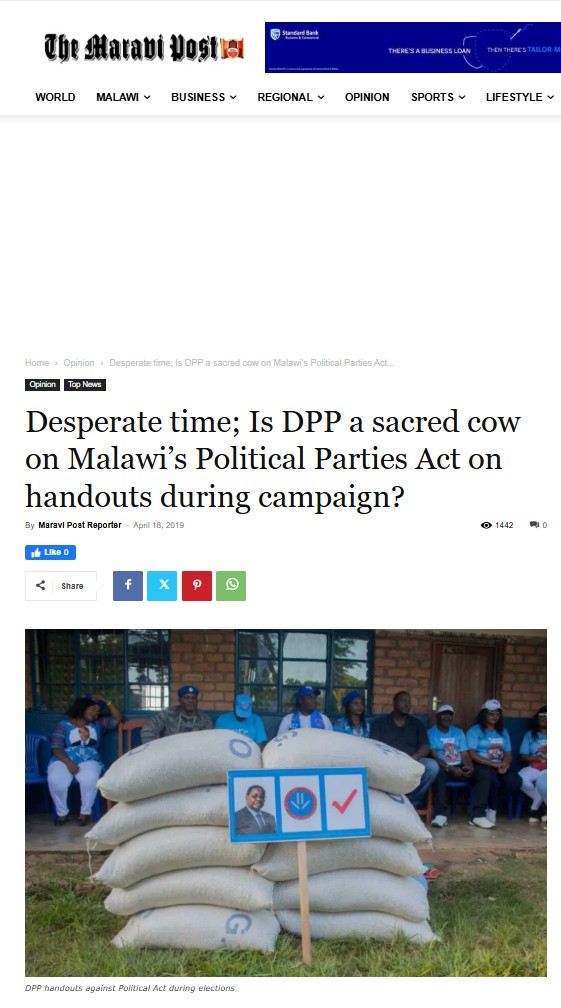Not a registered member of any political party, but definitely a paid-up member of Common Sense Society (Malawi Chapter, defunct)
There comes a time in every democracy’s journey where the nation must pause, look inward, and ask itself one sobering question: “Are we mad, or just selectively sanctimonious?”
This week, the Registrar of Political Parties having presumably run out of party manifestos to skim through has written a stern letter to the Malawi Congress Party, scolding them for the egregious, apocalyptic offense of… wait for it… transport refunds.
Yes, in a country where procurement corruption is whispered like a lover’s name and campaign promises are broken faster than fast-track court dates, it is transport refunds that have finally summoned the moral outrage of our institutional guardians. Hallelujah.
Let’s be clear: this is not an article defending Chakwera or his handlers. No, this is an article defending context, consistency, and most importantly, collective memory, which, like government laptops, often gets lost during transitions.

Of Handouts and Holy Hypocrisy
The opposition, incensed and indignant, has cried foul. “This is voter bribery!” they shout, clutching their party-branded wrappers and discount fertilizer vouchers from elections past.
The DPP having previously held office under a regime that distributed cash, maize, motorcycles, and the occasional bicycle pump during campaign rallies is now reborn as a paragon of electoral purity. One can only assume that their recent pilgrimage to political virtue involved fasting from irony.
Where were these indignations when candidates held rallies with envelopes thicker than a Civil Servant audit report?
Where were these emergency press conferences when fuel coupons rained like manna from the heavens in Machinga and Nsanje?
Where was the Registrar’s righteous pen then? Perhaps it was busy trying to find its own transport refund.
The Legal Loophole Olympics
Let us now pretend we are not Malawians. Let us feign shock, yes shock! that politicians give out handouts. Let us act as if this is not a practice as old as our electoral register.
And yet, somewhere in the hallowed halls of Parliament, lawmakers passed Section 41 of the Political Parties Act: a well-intentioned law designed to rid us of clientelist politics. Noble. Necessary. But also, naïvely selective in its application.
Because if we are to outlaw all acts that may “induce support,” shall we also ban:
- branded t-shirts?
- mealie meal donations during floods?
- phone data bundles for WhatsApp campaign groups?
- presidential invitations to State Residences thinly veiled as civic engagement?
Or shall we only act when the sitting President does it and preferably when he’s on the campaign trail?
What Is Tradition If Not Institutionalised Loopholes?
In Malawi, every political party has participated in the great Olympic sport of “Community Development by Stomach Infrastructure.” It’s a cross-party tradition, passed down like sacred liturgy. You give sugar, I give soap. You build boreholes, I open a bridge. We all forget the constitution together.
Yet when MCP does what MCP, DPP, UDF, and every village-level councillor has done before, we cry “corruption” like it’s a new song on MBC. The only difference this time is that the ruling party did it too effectively. And that’s the true crime, isn’t it?
The Real Issue: Monopoly, Not Morality
Let us stop pretending this is about ethics. It is not. This is about access.
The opposition is upset not that handouts are happening, but that they are happening without their participation. The State Residence is now a stage where one party stars, and the others are left auditioning in community halls. That, dear reader, is not a crisis of integrity. It’s a crisis of invitations.
The Registrar’s Dilemma: Fairness or Optics?
To be fair, the Registrar is in a tight spot. Enforce the law, and you’ll be accused of political targeting. Ignore it, and you validate lawlessness.
But the solution is not to become a reactionary moralist, pulled by whichever party screams loudest in the news cycle. The solution is to institutionalize consistency, not performative crackdowns. You cannot raise the red card only when the cameras are rolling.
Otherwise, we risk becoming a nation of lawful amnesiacs, selectively remembering rules only when they’re politically convenient.
A Modest Proposal
If we are to rid our democracy of inducements, let us begin with honesty.
Let us admit that until we build a system that:
- publicly funds campaigns,
- levels access to media,
- and separates state function from party activity,
then the war against handouts will remain an illusion: a law in the books, violated in the bush, and enforced in the headlines.
Conclusion: When Saints Protest Sins They Invented
So before we canonize the opposition and crucify the incumbents, let’s pause. Let’s remember.
The next time a party cries foul over political handouts, ask not “what law was broken?”, but rather “what privilege was denied?”
Because in Malawi, we don’t outlaw political culture we just outsource it to whichever side is not in power.







